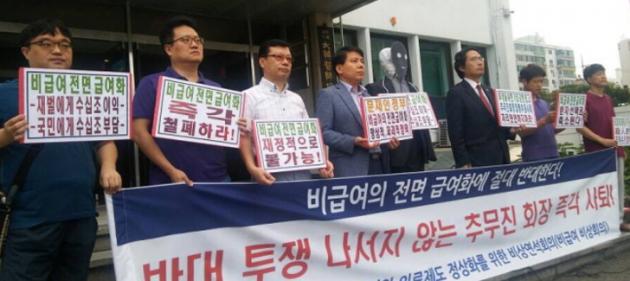President Moon Jae-in’s announcement Wednesday to invest 30.6 trillion won ($26.8 billion) over the next five years to cover all medical treatments has triggered criticism from the medical community as being “anti-constitutional.”
Although most medical workers acknowledge the policy’s intent to reduce the public’s burden of medical spending, they point out that the move could disrupt the entire health insurance system without improving the nation’s healthcare system fundamentally.
Medical organizations, including the Korean Society of Thoracic Surgeons대한흉부외과의사회, Korean Doctors Society평의사회, Korean Society of Neurologists대한신경과의사회, and the National Union of Korean Medical Doctors전국의사총연합, held emergency meetings to oppose the policy and called for “normalizing” the health care system.

The Korean Medical Practitioners Association대한개원의협의회 (KMPA) described the policy as an “unrealizable and undesirable” plan, opposing to the “radical and reckless” application of insurance benefits.
The association cited that the move is not only unnecessary but impossible to implement. “This will inevitably lead to the collapse of health insurance finances and ultimately threaten the health and life of the people,” it said.
The KMPA has called for the “immediate withdrawal” of the policy, or it would stage a protest campaign using all means available.
Korean Doctors Society has followed suit, saying that Moon’s healthcare policy is “the worst policy in Korea’s medical history if enforced without the preceding step of making up for costs” and that the government should immediately stop “anti-democratic populist policy.”
The society issued a statement saying that the policy “exploits 130,000 doctors and requires the sacrifice of the medical professionals, resulting in a disaster by driving many medical institutions into bankruptcies.”
The Korean General Practitioners' Association대한일반과의사회 also voiced their opposition saying that the complete coverage plan is an “anti-constitutional policy violence that ignores liberalism, market economy, and capitalism, which constitute the foundation of the Constitution.”
The association stated the policy, if carried out comprehensively and immediately, will deplete health insurance finances, leading to the drastic increase in health insurance premiums or drops in fees paid to medical institutions, causing “great confusion.”
The Korean Medical Association대한의사협회 representatives agreed.
“The government should recognize grave problems with the new healthcare policy and review it to engage in genuine dialogue with members of the medical profession,” a representative said. “If the government ignores the opinions of medical professionals, we will push forward to mobilize all capabilities and methods to fight against the policy.”
Labor and civic organizations, on the other hand, responded positively to the government’s announcement, albeit unsatisfied with the level of coverage.
The Korea Health and Medical Workers Union전국보건의료산업노동조합 said, “We view the policy direction of expanding universal protection and strengthening the medical safety net positively, but the target level of coverage remains too passive. It should go up to at least the 80-percent level.”
“There is still a lot of work to be done, such as imposing ceilings on patients’ burdens and insufficient policy steps to control costs. We need to get closer to a national consensus to achieve successful reforms through more detailed discussions,” the union said.
The Free Health Care Campaign Center무상의료운동본부, which blocks the privatization of health insurance and realize free medical service, said, “This protection plan includes some progress compared to the past policies, but it is still insufficient to create ‘a country free from concerns about medical expenses.’”
The government should set long-term goals and plans to implement them faithfully and achieve the OECD-level of health insurance coverage,” the center added.

